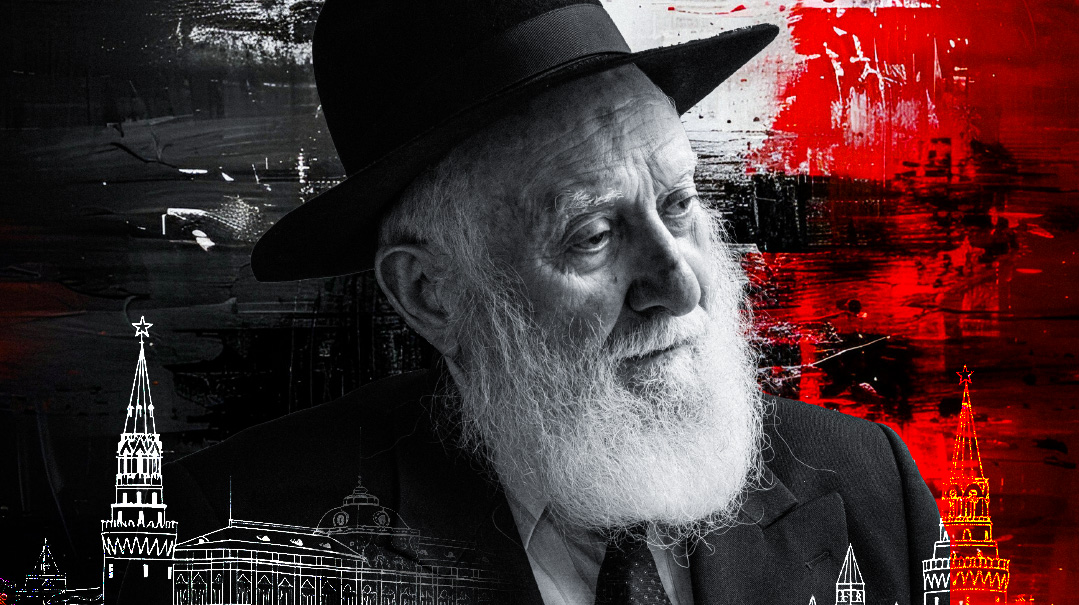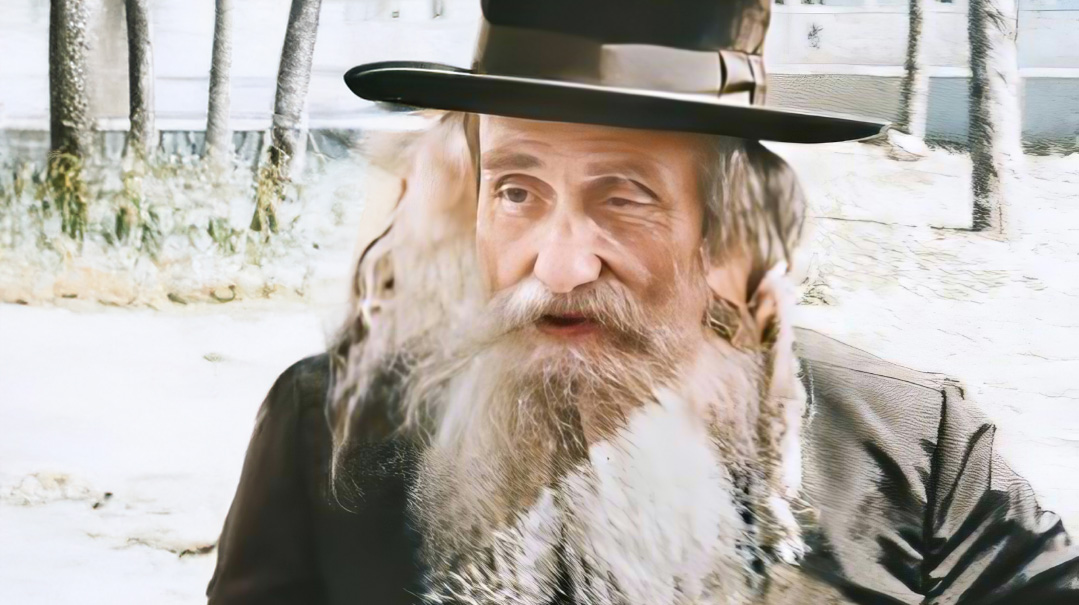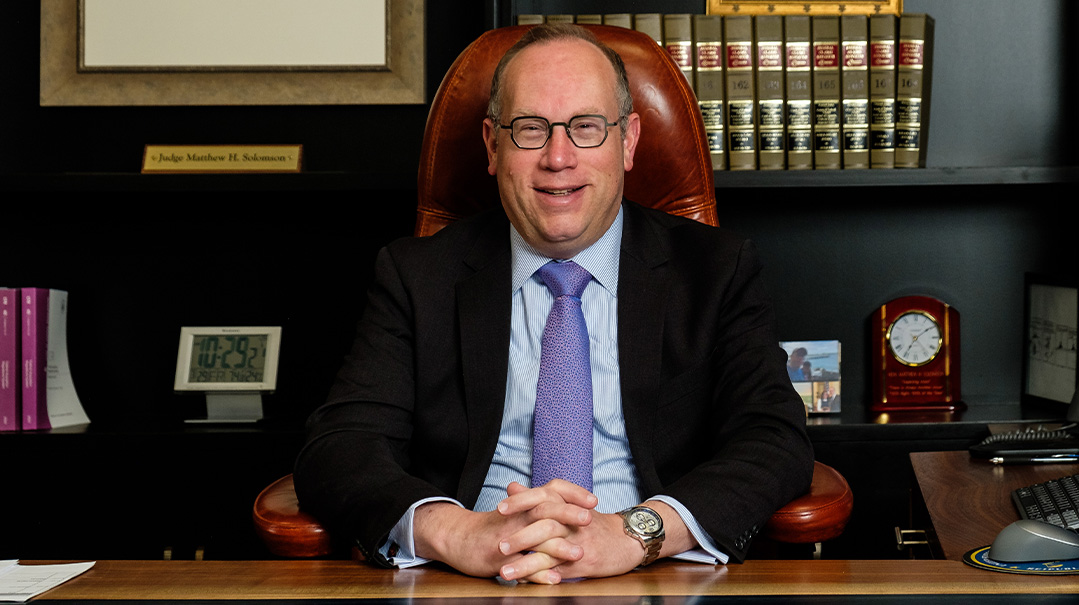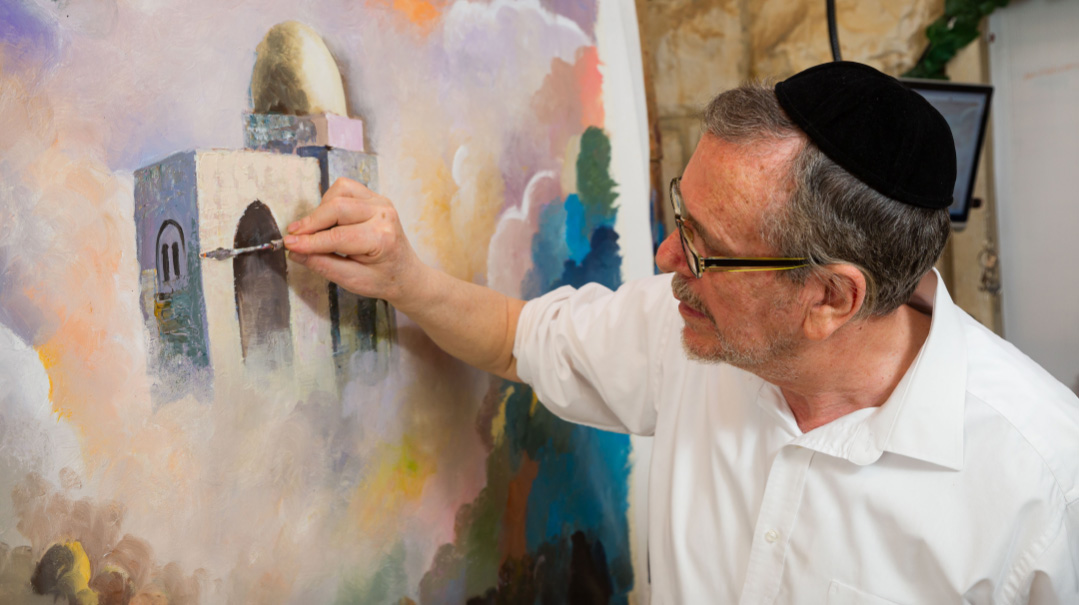Running Against the Grain

High school sprinter Oliver Ferber put Shabbos in first place
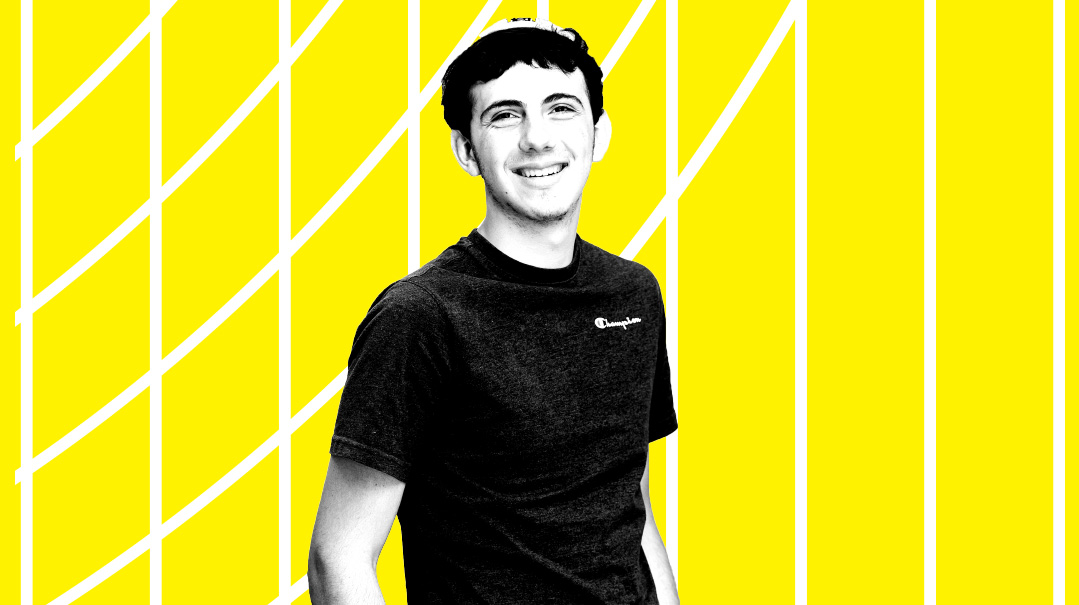
Photos: Elchanan Kotler, Family archives
Every American Jew of a certain age remembers the decision of Sandy Koufax not to pitch the opening game of the 1965 World Series because it fell on Yom Kippur. That decision filled Jews across the country with pride, and caused many to ask themselves whether they, too, should make some sacrifices for their Judaism. At a time when most American Jews still sought to maintain a low profile, Koufax openly proclaimed his Jewish identity.
The Maryland state cross-country championship for smaller, independent schools does not exactly occupy the same spot on the American sports calendar as the World Series. And Oliver Ferber, the third or fourth best runner on the Charles E. Smith Jewish Day School (JDS) cross-country team, cannot claim a position in the pantheon of great Jewish athletes comparable to that of Sandy Koufax, generally considered the greatest baseball pitcher of all time.
Yet in at least one respect, Oliver’s decision not to run in the aforementioned state championship race, because it took place on Shabbos, conveyed an even more powerful educational message to American Jewry than that of Koufax. In 1965, most American Jews still observed Yom Kippur in some fashion, and were well aware that playing baseball and Yom Kippur did not mix.
Today, few non-Orthodox American Jews have any idea of what Shabbos is. They go about their normal activities on Saturday just as they would on any other day of the week. The idea that a Jewish high school junior might pass up athletic glory because of something called Shabbos is barely comprehensible to the vast majority of American Jews.
Yet Oliver Ferber did precisely that in November 2021 when he declined to run in the Maryland state cross-country championship for small private schools — which his school Charles E. Smith Jewish Day School (JDS) was favored to win — because the race fell on Shabbos. He made that decision on his own, with almost no outside support. What made a 16-year-old student at a pluralistic Jewish school choose to go against the grain of his familial upbringing and education?
A long article entitled “A state championship or his faith? The agonizing choice of a young Jewish runner,” appeared on the website of ESPN, one of the world’s most-visited sports websites, during Chol Hamoed Pesach, accompanied by a seven-minute video, “Running on Faith.”
Author Sam Borden captured the pressures brought to bear on Oliver, then a 16-year-old high school junior, to run from the moment he told his teammates on a training run two months prior to the state championships that he might have to skip the race because of Shabbat.
The typical high school cross-country competition traverses approximately five kilometers, or three miles, over natural terrain, including hills. Though cross-country is an individual sport, state team championships are determined on the basis of the top five times from a particular school. Thus even the loss of the third- or fourth-best runner, such as Oliver, could have a decisive impact on the overall rankings.
Oliver’s ultimate decision not to run was completely at odds with his familial background — very Jewishly identified, but not halachically observant. His mother, Karyn, comes from a traditional South African Jewish family; his father, Scott, was raised in a Reform household, and followed Karyn’s lead to greater Jewish involvement. Shabbos candles and Friday night meals, often with Karyn’s parents, were standard, and no pork or shellfish are allowed in the Ferber home.
“Saturday morning, however, was for sports, whatever they wanted to do…” Karyn told ESPN, with Scott adding, “Shabbat was not different than the other days.”
Nor did the resolutely nondenominational Charles E. Smith Jewish Day School, a pricey K-12 private school (high school tuition is over $40,000), with high academic standards (average SATs 1344), have any problem with the Shabbos competition. The Ferbers’ life plan for Oliver — good college, graduate or professional school, good job — would describe that of most JDS parents.
Oliver was subjected to constant pressure from the moment he announced that he was considering not running. Perhaps most challenging was his teammates’ feeling of betrayal at the likelihood that his decision not to run would cost them the state championship.
His first cousin, David Fritz, the star of the JDS team and born only eight days after Oliver, described to Borden how he reacted: “You’re about to throw this all away for all of us? I felt so hurt that he was going to sit this out.”
Jason Belinkie, the school’s longtime cross-country coach, spoke to Oliver numerous times, and showed him a chart comparing the team’s best times with those of their closest rival to demonstrate that Oliver’s absence from the state championships would likely cost JDS the title. Belinkie told Oliver that he had dealt with logistical questions of transporting runners who considered themselves shomer Shabbat to the state championships, but never before had a runner questioned whether it was permissible to run at all on Shabbat.
Soon Oliver found himself isolated and shunned by his teammates, with whom he had run for three years. The rest of the team formed a group chat, “state runners,” from which he was excluded. When he told a teammate that he would still come to the race to cheer the team on, the teammate replied, with what degree of seriousness Oliver could not be sure, “If you’re not going to race, don’t show up. No one wants to see your face.”
Nor did he get any support from his close-knit family. His mother Karyn, the “minister of the interior” in the home, insisted that helping a Jewish school win a state championship would be a great achievement, and pushed Oliver to “run for the Jewish People.” She told him that by joining the cross-country team, he had made a commitment, adding, “You are letting down your teammates, your school, and your family.” His maternal grandfather, who is active in the Jewish community of Washington, D.C., told him an Orthodox friend of his had assured him that halachah allowed for Oliver to run.
In the end, JDS beat the predictions and won the state championship by a scant three points, without Oliver. The latter was happy for his teammates and relieved that his non-participation had not ruined their hopes. Even before the race, his teammates’ attitude had softened. They had seen close up how difficult his decision was for him. The same teammate who had told him not to show his face if he did not race in the end assured him that the team would not blame him for any negative result.
After the victory, he walked around with his cousin, David Fritz, who had captured the individual trophy, for about a half hour. His teammates were ready to include him in group photos, and his coach offered to buy him a state championship sweatshirt, but Oliver politely declined all such offers, knowing the victory was not his.
As soon as I read Oliver’s story (which quickly garnered wide attention in the Jewish press), I knew that I wanted to interview him and find out what made him different. Through friends in the DC area, I was put in touch with Rabbi Reuvane Slater, Oliver’s Gemara rebbi in JDS.
Rabbi Slater, a product of Yeshivas Chofetz Chaim and a musmach of Mesivta Tiferes Yerushalayim, is the only such yeshivah product on the JDS faculty. He sent me a clip he had made of Oliver enthusiastically explaining the shakla v’tarya of the Gemara to his classmates, using a whiteboard diagram.
Better yet, he contacted Oliver, who is currently in Israel, with other early graduating seniors at JDS, and we arranged to speak. The night before the scheduled interview, Oliver contacted me and asked me what he should wear to the interview, which would include a photo shoot. I told him his normal clothes would be fine, though it would be best to avoid running shorts. Thus I was a bit surprised when he arrived at my door — a tall, gangly teenager in running shorts. (His credit card had failed on the bus, so he got off and ran the last two miles to my apartment. A pair of pants, however, were in his backpack.)
Oliver applies the term “loosy-goosey” to himself, when describing his initial approach to distance running. The term captures something of his external affect. But it did not take long into our conversation before I realize how superficial a description it is. Far more relevant is another offhand description he offers of himself.
“There’s some steel in me,” he comments, without a trace of braggadocio.
That steel explains what enabled Oliver to withstand all the pressures brought to bear on him — pressures that left him sobbing in solitude on several occasions.
But it does not explain what brought Oliver to that point in the first place. For that, another of Oliver’s self-descriptions is required: “I’m a thinker. I like to mull things over.”
That self-definition is confirmed by Oliver’s NCSY high school advisor, Rabbi Yehoshua Kent, whom Oliver refers to throughout our conversation as “Rabbi Josh.” The latter remembers the first time Oliver turned up at an NCSY lunch-and-learn event in ninth grade. He remained apart from the group, perched on a nearby windowsill. The same thing the next week. But even though Oliver remained apart, it turns out he was listening intently.
“Things have to make sense to him, and for that to happen, he is willing to think about them for a long time,” Rabbi Kent remembers. “He would often ask me about things I had said months earlier in a Zoom class, when I wasn’t even aware that he was there. Until today, he will quote back to me things that I said years ago.”
In discussing his religious development, Oliver focuses on the contradiction between what they were learning in school and what he and his family actually did. “My basic feeling was: Either we should act according to Jewish law or do nothing.”
While that basic dichotomy drove him, his development was gradual. Already in junior high school, he began adopting more mitzvah observance. At his family’s Shabbos night meals, for instance, there was always some symbolic separation between milk and meat at the table, but there could be a dairy desert after a meat meal. Oliver knew that there was supposed to be a waiting period between milk and meat (though he thought it applied equally to milk products preceding meat), and started by drinking water between meat and milk, gradually extending the separation by 15-minute intervals.
At some point, however, he went to a Chabad website and discovered that there was supposed a six-hour separation between meat and milk, and that’s what he began doing. Much of his halachic practice came from his own online research of that nature.
Next he told his mother that he only wanted to eat kosher meat. She had no problem buying him kosher steaks.
“It was like I had decided to become a vegetarian or adopt a special health diet,” Oliver comments.
Eventually, the requests became more burdensome, such as asking his mother to set up a Shabbos blech for his food. And they also became more intrusive on the other members of the family.
The Ferbers own a beachhouse near the shore, where they spend weekends during the summer. Their practice was to leave their Bethesda home on Friday evening, after the worst of summer traffic had abated. But then Oliver announced he could no longer accompany the family for the weekend if it required driving on Shabbos. And again, his parents complied, though there was some pushback from his siblings — an older brother and two younger sisters.
And Oliver’s gradual religious development began to extend beyond ritual observance into ethical considerations. His cousin David Fritz told ESPN’s Borden about a time that they went to a Washington Nationals game. When the more expensive box seats opened up in the later innings, Fritz proposed that they jump down to the lower seats from theirs in grandstands.
But Oliver told him, “Well, I need to think about the halachic arguments to figure out whether that is an ethical thing to do.”
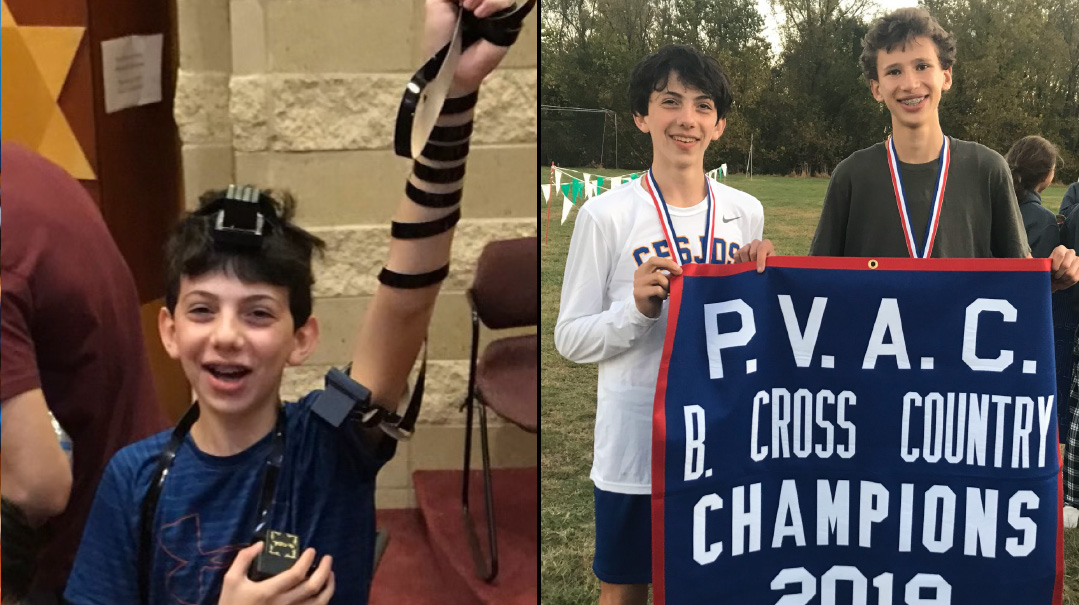
“My basic feeling was, either we should act according to Jewish law or do nothing.” While Oliver stuck to his principles, he was essentially going it alone
The start of high school marked a big change for Oliver on many fronts. He followed the standard advice given to high school freshmen — “try everything.” That’s what led him to try out cross-country running. Although his mother is a jogger, and she pushed him, Oliver remained a bit on the fence, not fully committing to excelling in the sport. But as his PR (personal record) began to drop in training runs, the discipline of being able “to endure, tough it out,” began to grow on him.
And the same curiosity that led him to try cross-country (and debate and chess club) also made him willing to check out the Tuesday afternoon NCSY lunch-and-learn in the school, whose student body counts between 20 percent and 25 percent from modern Orthodox-affiliated homes. Soon thereafter, he joined a once-a-week NCSY-sponsored program at the local JCC, named for Maryland’s Jewish senator Ben Cardin, where swimming and dinner were combined with discussion groups about topics related to Jewish leadership.
A number of Oliver’s choices upon entering JDS reflected his growing interest in his Judaism. The elementary school schedule included a period of the day styled as “zeman kodesh” that included davening among a number of options from which students could select. He elected to participate in the egalitarian minyan, but the amount of talking there bothered him, and at the beginning of high school, he switched to the Orthodox minyan. He also opted for the Gemara track, which is purely optional.
But it was Covid that really jump-started Oliver’s religious development. JDS was closed entirely for months, before switching to a hybrid schedule of in-school and at-home days. During that period, Oliver suddenly found himself with plenty of time on his hands, and he began davening three times a day. He credits Rabbi Avrohom Chaim Feuer’s Shemoneh Esrei with helping him greatly as he intensified his davening.
And for the first time, he decided to observe Shabbos fully. That was not always easy, as he had to do so all by himself.
“Imagine a beautiful summer day at the shore, and you’re unable to do anything outside because there is no eiruv, and there’s nothing to do for 25 hours besides read,” he recalls.
Eventually, the desire to keep Shabbos caused him to become much more involved with the NCSY chapter in Potomac, about five miles from his home.
“Initially, I was bicycling to Potomac and back on Shabbos,” Oliver remembers. “But then I began worrying that carrying a water bottle on the bike without an eiruv might be problematic. So I went online to check it out, and discovered that biking itself is forbidden.”
So instead of biking, he began to run to Potomac.
“How did you reconcile your running to Potomac on Shabbos with your refusal to do so a year later for the state championships?” I ask him.
Oliver is ready for that question. Competitive running, he says, is completely different from jogging: “It is very intense. Every step hurts, especially running up hills, and you have to overcome the constant discomfort and pain.”
He quotes a Taz to support his distinction: “It is certainly possible to derive pleasure as a result of exercise… [Nevertheless,] it is forbidden, because while running, [one] doesn’t enjoy the experience, and it is not permitted on the basis of the pleasure [one] experiences afterwards.”
In other words, the joy of winning a state championship would not retroactively justify the difficulty and pain of competitive running.
During Covid, NCSY closed down all its in-person programming. Rabbi Kent was reduced to giving shiurim on Zoom, something he found very difficult, and it did not draw a large audience. But Oliver was a regular participant, and always pressing him to teach more. Rabbi Kent also opened an outside weekly kiddush that met even in the winter, and Oliver was a regular.
Despite his growing religious commitment, Oliver’s decision not to run in the state cross-country championship his junior year was far from inevitable or easy.
“I cried a few times,” he admits, and went back and forth more than once. “Until the very end, I didn’t know what I would do,”
Pretty much the only one in Oliver’s corner during that fraught period was Rabbi Kent.
“I spoke briefly to Rabbi Josh at the beginning, but I really tried to keep him out of the decision for a while,” Oliver tells me. “Only when it became too stressful did I start speaking to him again.”
But in the end, the decision was his, and his alone. And that is precisely how both he and Rabbi Kent wanted it. Rabbi Kent never suggested that there might be heterim for Oliver to run. But, on the other hand, he never told him straight out that he should not run.
“You have to let them make their own decisions,” is how Rabbi Kent describes his kiruv philosophy.
And Oliver insists, “I really tried to decide all alone. I wanted to do it myself.”
In discussing the aftermath of his decision, it is clear why it had to be that way. During the entire process of his increasing religious commitment, Oliver’s parents, Scott and Karyn, had treated it as a phase he was going through and would eventually outgrow.
“I also wondered,” concedes Oliver. “Every week, I would ask myself whether I was going to keep Shabbos. And it never became an automatic default for me such that I no longer had to think about it.”
And there were lesser tests along the way as well. During the Covid school closures, Oliver became an avid fencer, with the local fencing club one of the few venues still providing a degree of social contacts. Practices were four times a week, including Shabbos, for three hours at a time. Oliver found himself very uncomfortable explaining why he could not come to practices because of Shabbos.
After sitting out the state championship meet, however, Oliver felt that his own self-doubt about whether he was just going through a religious phase was over: “This is who I am.”
By making a very public and painful sacrifice for Shabbos, he had firmly placed himself in a different category — not a flighty teenager pursuing a passing whim, but a mature thinker with the courage to pay the price of his convictions.
The attitude of his family members changed as well, when they saw how serious he was and how much he was willing to sacrifice. At the beach on Shabbos, his youngest sister had always begged him to come and build sand castles with her. After the state championship, she stopped asking. Complaints from siblings that he was imposing his religious restrictions on them also decreased dramatically.
It was not long after Pesach when Oliver and I met, and I mentioned to him Rav Aaron Lopiansky’s essay in the Pesach edition of Mishpacha, in which he discusses how Klal Yisrael needed two mitzvos involving mesirus nefesh — the blood of the Korban Pesach and of bris milah — as the final preparation for the redemption from Mitzrayim. Acts of personal sacrifice are felt throughout all the generations to come.
Oliver agrees that passing his test has given him new confidence in who he is and what he can pass on. In the course of the conversation, he drops the phrase, “religious Jews, such as myself,” and it is clear that for him, the mitzvos are no longer something he does, but who he is.
“I’m independent — I choose my own path in life,” is how he describes the transformation in himself.
And he recognizes that the tests he has gone through and the need to define himself have given him an advantage over those just following a prescribed path. At some point, he realized that his commitment is greater and his religious identity more secure than those of many of his modern Orthodox-affiliated classmates, whom he had looked up to at the beginning of his journey.
“It’s weird,” he says.
With his newfound confidence from passing the Shabbos test, he followed his coach’s advice and wrote a letter to Mr. Greg Dunston, the longtime meet director of the state championship race, in which he described what he had gone through leading up to the state championship race:
I could either race at states, which would fall during Shabbat, and violate all of my religious beliefs, or I could observe Shabbat, but potentially deny the opportunity to myself and my teammates of winning a state championship…
I felt extraordinarily depressed and anxious. Those days were the most stressful once I’ve experienced in my life…
[For] me, and future runners, it would mean the world to be able to both race and keep Shabbat.
Dunston, who had previously brushed aside similar requests from Coach Belinkie, was moved by Oliver’s request and decided to see whether he could accommodate it: “You could tell by his letter that he really wanted to compete and be with his teammates. And this was going to be the last time he would get to do it.”
In mid-June, Oliver and his teammates learned that the 2022 state championships would be held on Sunday. Not only did Oliver get his chance to compete, but last November, he celebrated together with his teammates, as JDS captured its second successive state championship for small private schools.
Now, he is looking to the future with excitement. He spent last summer in Israel with the NCSY Kollel, after his junior year. The experience presented its own challenges: He became very sick almost from the beginning of the program. And being one of a small minority of ten to fifteen without a day school background, within a much larger group of 300 day school graduates, was a bit of a culture shock.
But despite his lack of formal educational background, he found the night seder shiurim of Rabbi Mordechai Burg, a leading educator and speaker, entitled “Authentic Judaism” to be “mind-expanding.” And most important, Oliver was exposed during the summer to the concept of a gap year in yeshivah prior to college, and will be spending the upcoming year in Aish HaTorah’s Gesher program.
Though Oliver is mindful that there will likely still be a few bumpy patches with his parents over his religious direction, the decision to take a gap year in Israel was not contentious. On almost every college campus he and his mother visited last fall, they met Orthodox Jewish students who had spent one or two years in Israel after high school, and who were able to reassure Mrs. Ferber that their academic careers had not been adversely affected.
The ESPN article and video were “cool,” Oliver tells me, and it was far better to receive many messages of support for his determination to remain faithful to his religious beliefs than to have to face the disappointed faces of those who felt he had let them down.
But at the end of the day, he sums up, “The ESPN story does not change who I am at the core. I just have to keep on being me.”
To that I reply, “ESPN won’t change you, but the decision not to race has already changed you.” He does not disagree.
Before Oliver departs, I put to him the question with which I began: “What made you different? Why out of 100 fellow students in your class were you the only one to grow so much religiously?”
Without bravado, he replies, “I guess I really thought about things more. What am I doing? Why I am doing it?”
There is obviously no magic formula to produce those willing and capable of thinking for themselves. But Oliver’s sacrifice and the very wide exposure his decision received through ESPN offer hope that he will become a model to be emulated for many more Jewish youngsters.
(Originally featured in Mishpacha, Issue 964)
Oops! We could not locate your form.

